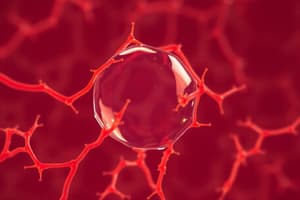Podcast
Questions and Answers
Which of the following areas is NOT typically covered in GCSE Biology?
Which of the following areas is NOT typically covered in GCSE Biology?
- Genetics
- Photosynthesis
- Homeostasis
- Atomic Structure (correct)
Which assessment method is commonly used in GCSE Science for evaluating practical experiments?
Which assessment method is commonly used in GCSE Science for evaluating practical experiments?
- Written exams (correct)
- Peer assessments
- Creative projects
- Oral presentations
In GCSE Chemistry, which of the following topics is least likely to be included?
In GCSE Chemistry, which of the following topics is least likely to be included?
- Wave Mechanics (correct)
- Bonding
- Energy Changes
- Reactions of Acids
Which core mathematical skill is essential for solving problems in real-world scenarios according to GCSE Maths?
Which core mathematical skill is essential for solving problems in real-world scenarios according to GCSE Maths?
What is primarily emphasized in the experimentation aspect of GCSE Physics?
What is primarily emphasized in the experimentation aspect of GCSE Physics?
Which concept is least likely to be involved in the study of ecosystems in GCSE Biology?
Which concept is least likely to be involved in the study of ecosystems in GCSE Biology?
Which of the following is an example of a practical technique students may explore in GCSE Science?
Which of the following is an example of a practical technique students may explore in GCSE Science?
What type of concepts primarily underlie GCSE Maths?
What type of concepts primarily underlie GCSE Maths?
Flashcards
GCSE Science Subjects
GCSE Science Subjects
GCSE Science usually includes Biology, Chemistry, and Physics, each assessed separately.
GCSE Maths Focus
GCSE Maths Focus
GCSE Maths covers core mathematical concepts and skills in a single subject, like numbers, algebra, geometry and statistics.
GCSE Science Practical Work
GCSE Science Practical Work
GCSE Science often involves practical experiments using techniques like microscopy and data analysis, and experimental design.
GCSE Maths Problem Solving
GCSE Maths Problem Solving
Signup and view all the flashcards
Biology Key Areas
Biology Key Areas
Signup and view all the flashcards
Chemistry Topics
Chemistry Topics
Signup and view all the flashcards
Physics Key Topics
Physics Key Topics
Signup and view all the flashcards
GCSE Maths Core Topics
GCSE Maths Core Topics
Signup and view all the flashcards
Study Notes
GCSE Science and Maths: Overview
- GCSE Science typically covers Biology, Chemistry, and Physics. These subjects are studied separately and assessed as individual modules.
- GCSE Maths focuses on core mathematical concepts and skills. It is usually one single, assessed subject.
- Both subjects often involve practical experiments and problem-solving tasks.
- Assessment methods include written exams, coursework, and sometimes practical assessments (e.g., lab experiments).
- Specific content varies by exam board but generally covers core, foundational knowledge within each subject.
GCSE Science: Biology
- Key areas typically include: cells, biological molecules, organisms and populations, genetics, evolution, and human biology including homeostasis, the nervous system, and the excretory system.
- Concepts of structure and function, processes like photosynthesis and respiration, and relationships within ecosystems, are usually examined.
- Practical work often explores techniques like microscopy, measuring quantities, using data analysis software, and experimental design.
- Understanding scientific methodology and reporting experiments are important components.
GCSE Science: Chemistry
- Topics generally include atomic structure, bonding, reactions, chemicals in the environment, and energy changes.
- Reactions like acids and alkalis, redox reactions are typically explored.
- Students should learn the application of scientific knowledge to issues and problems in modern life.
- Practical investigations often involve using laboratory techniques like titration, heating substances or testing various substances with standard indicators.
GCSE Science: Physics
- Key topics usually include mechanics (forces, motion, energy), waves, electricity, and magnetism and further developments in modern physics.
- Concepts like work, energy, momentum and understanding waves will be required.
- Experimentation and data analysis are essential parts of the subject.
GCSE Maths: Overview
- Core topics in mathematics include: Number (integer and decimals, fractions), Algebra (equations, formulae), Geometry (shapes, angles), and Statistics and probability.
- Problem-solving skills are essential for applying mathematical principles to real-world scenarios.
- Students typically learn to apply quantitative skills such as ratios, percentages, and using measurement units.
- Practical aspects may include constructing geometrical models or using spreadsheet and graphing software for analysis and representation of data.
- Proficiency in using mathematical tools like calculators and drawing instruments is sometimes assessed.
- Specific formulas or techniques are often taught with significant practice required for deeper understanding and application, especially in areas like problem-solving.
Studying That Suits You
Use AI to generate personalized quizzes and flashcards to suit your learning preferences.





